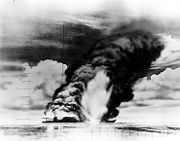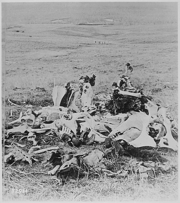
Victory disease
Encyclopedia

Military history
Military history is a humanities discipline within the scope of general historical recording of armed conflict in the history of humanity, and its impact on the societies, their cultures, economies and changing intra and international relationships....
, because of complacency and/or arrogance
Hubris
Hubris , also hybris, means extreme haughtiness, pride or arrogance. Hubris often indicates a loss of contact with reality and an overestimation of one's own competence or capabilities, especially when the person exhibiting it is in a position of power....
brought on by a victory
Victory
Victory is successful conclusion of a fight or competition..Victory may refer to:**strategic victory**tactical victory** Pyrrhic victory, a victory at heavy cost to the victorious party**Victory columns**Victory Monuments**Victory personified...
or series of victories, an engagement
Engagement (military)
A military engagement is a combat between two forces, neither larger than a division and not smaller than a company, in which each has an assigned or perceived mission...
ends disastrously
Disaster
A disaster is a natural or man-made hazard that has come to fruition, resulting in an event of substantial extent causing significant physical damage or destruction, loss of life, or drastic change to the environment...
for a commander and his forces.
A commander may disdain the enemy, and believe his own invincibility, leading his troops to disaster. That commander may employ strategies
Military strategy
Military strategy is a set of ideas implemented by military organizations to pursue desired strategic goals. Derived from the Greek strategos, strategy when it appeared in use during the 18th century, was seen in its narrow sense as the "art of the general", 'the art of arrangement' of troops...
which, if effective in earlier combats or maneuvers, prove catastrophic against a new or smarter enemy; the commander afflicted by "victory disease" may also fail to anticipate a new enemy may use tactics different from those of old enemies. An overconfident commander may disregard military intelligence
Military intelligence
Military intelligence is a military discipline that exploits a number of information collection and analysis approaches to provide guidance and direction to commanders in support of their decisions....
which would enable the commander to realize that new tactics are needed.
Though "victory disease" does not inevitably foretell defeat, it often precedes it. The term is also applied outside the military world (see references).

Origin
The origin of the term ((戦勝病 senshoubyou) in JapaneseJapanese language
is a language spoken by over 130 million people in Japan and in Japanese emigrant communities. It is a member of the Japonic language family, which has a number of proposed relationships with other languages, none of which has gained wide acceptance among historical linguists .Japanese is an...
,http://groups.google.hu/group/soc.history.war.world-war-ii/browse_thread/thread/109cee3784b63713) is associated with the Japan
Japan
Japan is an island nation in East Asia. Located in the Pacific Ocean, it lies to the east of the Sea of Japan, China, North Korea, South Korea and Russia, stretching from the Sea of Okhotsk in the north to the East China Sea and Taiwan in the south...
ese advance in the Pacific Theater
Pacific Ocean theater of World War II
The Pacific Ocean theatre was one of four major naval theatres of war of World War II, which pitted the forces of Japan against those of the United States, the British Commonwealth, the Netherlands and France....
of World War II
World War II
World War II, or the Second World War , was a global conflict lasting from 1939 to 1945, involving most of the world's nations—including all of the great powers—eventually forming two opposing military alliances: the Allies and the Axis...
, where, after attacking Pearl Harbor
Attack on Pearl Harbor
The attack on Pearl Harbor was a surprise military strike conducted by the Imperial Japanese Navy against the United States naval base at Pearl Harbor, Hawaii, on the morning of December 7, 1941...
in 1941, Japan won a series of nearly uninterrupted victories against the Allies
Allies
In everyday English usage, allies are people, groups, or nations that have joined together in an association for mutual benefit or to achieve some common purpose, whether or not explicit agreement has been worked out between them...
in Southeast Asia
Southeast Asia
Southeast Asia, South-East Asia, South East Asia or Southeastern Asia is a subregion of Asia, consisting of the countries that are geographically south of China, east of India, west of New Guinea and north of Australia. The region lies on the intersection of geological plates, with heavy seismic...
and the Pacific http://www.theatlantic.com/doc/199903/victory-at-sea/3, http://books.google.com/books?id=GZCNhrm9eOYC&pg=PA17&lpg=PA17&dq=%22Victory+Disease%22&source=web&ots=MdG3-CFSbe&sig=yhamaYsO7WwY9toggaJ66nL1-ng&hl=en&sa=X&oi=book_result&resnum=6&ct=result#PPA18,M1.
Although the Japanese had planned to establish a perimeter and go on the defensive, victories encouraged them to continue expanding to where it strained logistics
Logistics
Logistics is the management of the flow of goods between the point of origin and the point of destination in order to meet the requirements of customers or corporations. Logistics involves the integration of information, transportation, inventory, warehousing, material handling, and packaging, and...
and the navy
Navy
A navy is the branch of a nation's armed forces principally designated for naval and amphibious warfare; namely, lake- or ocean-borne combat operations and related functions...
. This culminated in the Battle of Midway
Battle of Midway
The Battle of Midway is widely regarded as the most important naval battle of the Pacific Campaign of World War II. Between 4 and 7 June 1942, approximately one month after the Battle of the Coral Sea and six months after Japan's attack on Pearl Harbor, the United States Navy decisively defeated...
in 1942, a catastrophic defeat of the Japanese navy
Imperial Japanese Navy
The Imperial Japanese Navy was the navy of the Empire of Japan from 1869 until 1947, when it was dissolved following Japan's constitutional renunciation of the use of force as a means of settling international disputes...
: all four Japanese aircraft carrier
Aircraft carrier
An aircraft carrier is a warship designed with a primary mission of deploying and recovering aircraft, acting as a seagoing airbase. Aircraft carriers thus allow a naval force to project air power worldwide without having to depend on local bases for staging aircraft operations...
s involved were sunk, and the hitherto unstoppable Japanese advance was blunted.
Examples


- The Battle of SalamisBattle of SalamisThe Battle of Salamis was fought between an Alliance of Greek city-states and the Persian Empire in September 480 BCE, in the straits between the mainland and Salamis, an island in the Saronic Gulf near Athens...
in 480 BC in the Greco-Persian WarsGreco-Persian WarsThe Greco-Persian Wars were a series of conflicts between the Achaemenid Empire of Persia and city-states of the Hellenic world that started in 499 BC and lasted until 449 BC. The collision between the fractious political world of the Greeks and the enormous empire of the Persians began when Cyrus...
, in which the hubrisHubrisHubris , also hybris, means extreme haughtiness, pride or arrogance. Hubris often indicates a loss of contact with reality and an overestimation of one's own competence or capabilities, especially when the person exhibiting it is in a position of power....
of Xerxes IXerxes I of PersiaXerxes I of Persia , Ḫšayāršā, ), also known as Xerxes the Great, was the fifth king of kings of the Achaemenid Empire.-Youth and rise to power:...
led to the defeat of the Persian Empire by the GreeksAncient GreeceAncient Greece is a civilization belonging to a period of Greek history that lasted from the Archaic period of the 8th to 6th centuries BC to the end of antiquity. Immediately following this period was the beginning of the Early Middle Ages and the Byzantine era. Included in Ancient Greece is the...
.
- In 1415, the Battle of AgincourtBattle of AgincourtThe Battle of Agincourt was a major English victory against a numerically superior French army in the Hundred Years' War. The battle occurred on Friday, 25 October 1415 , near modern-day Azincourt, in northern France...
, the English were grossly outnumbered by 5 to 1, but the arrogance and disorganization of FrenchFranceThe French Republic , The French Republic , The French Republic , (commonly known as France , is a unitary semi-presidential republic in Western Europe with several overseas territories and islands located on other continents and in the Indian, Pacific, and Atlantic oceans. Metropolitan France...
knights, as well as superb quality longbows, were the underlying circumstances which led to the English overcoming the odds and annihilated the French.
- The overconfidence and lack of preparation led to the disastrous defeat of the English, led by Edward II at the Battle of BannockburnBattle of BannockburnThe Battle of Bannockburn was a significant Scottish victory in the Wars of Scottish Independence...
to the Scots, led by Robert the Bruce.
- SpanishSpainSpain , officially the Kingdom of Spain languages]] under the European Charter for Regional or Minority Languages. In each of these, Spain's official name is as follows:;;;;;;), is a country and member state of the European Union located in southwestern Europe on the Iberian Peninsula...
naval assault on EnglandEnglandEngland is a country that is part of the United Kingdom. It shares land borders with Scotland to the north and Wales to the west; the Irish Sea is to the north west, the Celtic Sea to the south west, with the North Sea to the east and the English Channel to the south separating it from continental...
in 1588 suffered the defeat of the "unsinkable" Spanish ArmadaSpanish ArmadaThis article refers to the Battle of Gravelines, for the modern navy of Spain, see Spanish NavyThe Spanish Armada was the Spanish fleet that sailed against England under the command of the Duke of Medina Sidonia in 1588, with the intention of overthrowing Elizabeth I of England to stop English...
. Similarly, BritishUnited KingdomThe United Kingdom of Great Britain and Northern IrelandIn the United Kingdom and Dependencies, other languages have been officially recognised as legitimate autochthonous languages under the European Charter for Regional or Minority Languages...
overconfidence led to the disasters of the English ArmadaEnglish ArmadaThe English Armada, also known as the Counter Armada or the Drake-Norris Expedition, was a fleet of warships sent to the Iberian Coast by Queen Elizabeth I of England in 1589, during the Anglo-Spanish War...
and the Battle of Cartagena de IndiasBattle of Cartagena de IndiasThe Battle of Cartagena de Indias was an amphibious military engagement between the forces of Britain under Vice-Admiral Edward Vernon and those of Spain under Admiral Blas de Lezo. It took place at the city of Cartagena de Indias in March 1741, in present-day Colombia...
.
- The decision of Napoleon to invade RussiaRussiaRussia or , officially known as both Russia and the Russian Federation , is a country in northern Eurasia. It is a federal semi-presidential republic, comprising 83 federal subjects...
in 1812. A force of between 580,000 and 690,000 FrenchFranceThe French Republic , The French Republic , The French Republic , (commonly known as France , is a unitary semi-presidential republic in Western Europe with several overseas territories and islands located on other continents and in the Indian, Pacific, and Atlantic oceans. Metropolitan France...
soldiers invaded, of which about 40,000 returned.
- United States victories in the Mexican–American WarMexican–American WarThe Mexican–American War, also known as the First American Intervention, the Mexican War, or the U.S.–Mexican War, was an armed conflict between the United States and Mexico from 1846 to 1848 in the wake of the 1845 U.S...
and the Indian WarsIndian WarsAmerican Indian Wars is the name used in the United States to describe a series of conflicts between American settlers or the federal government and the native peoples of North America before and after the American Revolutionary War. The wars resulted from the arrival of European colonizers who...
made UnionUnion (American Civil War)During the American Civil War, the Union was a name used to refer to the federal government of the United States, which was supported by the twenty free states and five border slave states. It was opposed by 11 southern slave states that had declared a secession to join together to form the...
forces over-confident going into the American Civil WarAmerican Civil WarThe American Civil War was a civil war fought in the United States of America. In response to the election of Abraham Lincoln as President of the United States, 11 southern slave states declared their secession from the United States and formed the Confederate States of America ; the other 25...
, losing their first battleFirst Battle of Bull RunFirst Battle of Bull Run, also known as First Manassas , was fought on July 21, 1861, in Prince William County, Virginia, near the City of Manassas...
— they expected a quick victory. The ConfederatesConfederate States of AmericaThe Confederate States of America was a government set up from 1861 to 1865 by 11 Southern slave states of the United States of America that had declared their secession from the U.S...
similarly stereotyped the Union, at times leading to military disaster.
- ConfederateConfederate States ArmyThe Confederate States Army was the army of the Confederate States of America while the Confederacy existed during the American Civil War. On February 8, 1861, delegates from the seven Deep South states which had already declared their secession from the United States of America adopted the...
decisions made at and before their loss at the Battle of GettysburgBattle of GettysburgThe Battle of Gettysburg , was fought July 1–3, 1863, in and around the town of Gettysburg, Pennsylvania. The battle with the largest number of casualties in the American Civil War, it is often described as the war's turning point. Union Maj. Gen. George Gordon Meade's Army of the Potomac...
, after their outnumbered-five-to-two victory at the Battle of ChancellorsvilleBattle of ChancellorsvilleThe Battle of Chancellorsville was a major battle of the American Civil War, and the principal engagement of the Chancellorsville Campaign. It was fought from April 30 to May 6, 1863, in Spotsylvania County, Virginia, near the village of Chancellorsville. Two related battles were fought nearby on...
during the Civil War.
- The 1876 Battle of the Little BighornBattle of the Little BighornThe Battle of the Little Bighorn, also known as Custer's Last Stand and, by the Indians involved, as the Battle of the Greasy Grass, was an armed engagement between combined forces of Lakota, Northern Cheyenne and Arapaho people against the 7th Cavalry Regiment of the United States Army...
, in which the SiouxSiouxThe Sioux are Native American and First Nations people in North America. The term can refer to any ethnic group within the Great Sioux Nation or any of the nation's many language dialects...
nearly annihilated the entire 7th Cavalry of Lt. Col. George Armstrong CusterGeorge Armstrong CusterGeorge Armstrong Custer was a United States Army officer and cavalry commander in the American Civil War and the Indian Wars. Raised in Michigan and Ohio, Custer was admitted to West Point in 1858, where he graduated last in his class...
. Expecting a repeat of the Battle of Washita RiverBattle of Washita RiverThe Battle of Washita River occurred on November 27, 1868 when Lt. Col. George Armstrong Custer’s 7th U.S...
, Custer ignored contrary intelligenceMilitary intelligenceMilitary intelligence is a military discipline that exploits a number of information collection and analysis approaches to provide guidance and direction to commanders in support of their decisions....
or did not seek it out.
- The 1879 Battle of IsandlwanaBattle of IsandlwanaThe Battle of Isandlwana on 22 January 1879 was the first major encounter in the Anglo-Zulu War between the British Empire and the Zulu Kingdom...
in which ZuluZulu KingdomThe Zulu Kingdom, sometimes referred to as the Zulu Empire or, rather imprecisely, Zululand, was a monarchy in Southern Africa that extended along the coast of the Indian Ocean from the Tugela River in the south to Pongola River in the north....
warriors equipped mainly with spears and shields annihilated a mixed British and native force armed with modern firearms and artillery, Followed by the subsequent defeat of a large Zulu force against a much smaller British contingent at the Battle of Rorke's DriftRorke's DriftThe Battle of Rorke's Drift, also known as the Defence of Rorke's Drift, was a battle in the Anglo-Zulu War. The defence of the mission station of Rorke's Drift, under the command of Lieutenant John Chard of the Royal Engineers, immediately followed the British Army's defeat at the Battle of...
.
- The catastrophic decision of Hitler to invade the Soviet UnionOperation BarbarossaOperation Barbarossa was the code name for Germany's invasion of the Soviet Union during World War II that began on 22 June 1941. Over 4.5 million troops of the Axis powers invaded the USSR along a front., the largest invasion in the history of warfare...
in 1941, underestimating SovietSoviet UnionThe Soviet Union , officially the Union of Soviet Socialist Republics , was a constitutionally socialist state that existed in Eurasia between 1922 and 1991....
military resilience, counting on success of old tactics, confident of quick victory and not counting on getting caught in a Russian winterRussian WinterThe Russian Winter is a common explanation for military failures of invaders in Russia. Common nicknames are General Frost, General Winter and General Snow. Another was "General Mud"....
or rasputitsaRasputitsaThe rasputitsa refers to the biannual seasons when unpaved roads become difficult to traverse in parts of Belarus, Russia and Ukraine. The word may be translated as the "quagmire season" because during this period the large flatlands become extremely muddy and marshy, as do most unpaved roads...
(mud seasonMud seasonMud Season is a term used to denote a time period in late Winter and early Spring. The name comes from dirt paths such as roads and hiking trails which become muddy from melting snow and rain. When the muddy paths and roads are traveled over by wheels, they develop ruts...
).
- Japan's decision to attack Pearl Harbor on December 7, 1941. This followed wins in the First Sino-Japanese WarFirst Sino-Japanese WarThe First Sino-Japanese War was fought between Qing Dynasty China and Meiji Japan, primarily over control of Korea...
the Russo-Japanese WarRusso-Japanese WarThe Russo-Japanese War was "the first great war of the 20th century." It grew out of rival imperial ambitions of the Russian Empire and Japanese Empire over Manchuria and Korea...
, the First World War and early victories during the Second Sino-Japanese WarSecond Sino-Japanese WarThe Second Sino-Japanese War was a military conflict fought primarily between the Republic of China and the Empire of Japan. From 1937 to 1941, China fought Japan with some economic help from Germany , the Soviet Union and the United States...
See also
- GroupthinkGroupthinkGroupthink is a psychological phenomenon that occurs within groups of people. It is the mode of thinking that happens when the desire for harmony in a decision-making group overrides a realistic appraisal of alternatives. Group members try to minimize conflict and reach a consensus decision without...
- HubrisHubrisHubris , also hybris, means extreme haughtiness, pride or arrogance. Hubris often indicates a loss of contact with reality and an overestimation of one's own competence or capabilities, especially when the person exhibiting it is in a position of power....
- Communal reinforcementCommunal reinforcementCommunal reinforcement is a social phenomenon in which a concept or idea is repeatedly asserted in a community, regardless of whether sufficient empirical evidence has been presented to support it. Over time, the concept or idea is reinforced to become a strong belief in many people's minds, and...
- Confirmation biasConfirmation biasConfirmation bias is a tendency for people to favor information that confirms their preconceptions or hypotheses regardless of whether the information is true.David Perkins, a geneticist, coined the term "myside bias" referring to a preference for "my" side of an issue...
- NarcissismNarcissismNarcissism is a term with a wide range of meanings, depending on whether it is used to describe a central concept of psychoanalytic theory, a mental illness, a social or cultural problem, or simply a personality trait...
- Pyrrhic victoryPyrrhic victoryA Pyrrhic victory is a victory with such a devastating cost to the victor that it carries the implication that another such victory will ultimately cause defeat.-Origin:...

